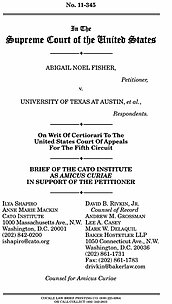Fisher v. University of Texas at Austin
Learn more about Cato’s Amicus Briefs Program.
The Supreme Court has waded back into the affirmative action thicket, taking up the issue of the proper role, if any, of race in college admissions. Abigail Fisher, who is white, was denied admission to the University of Texas at Austin even though her academic credentials exceeded those of many admitted minority applicants. She challenged UT-Austin’s consideration of race in selecting its incoming freshmen but lost before the district court in light of the Supreme Court’s 2003 ruling in Grutter v. Bollinger. In Grutter, a divided Court held that using race as a factor (but not as a factor tied to a set number of points or quotas) was justified in the name of diversity. But UT-Austin’s treats race in a different way, and gets different results, than did the admissions program Grutter upheld at the University of Michigan Law School. The Fifth Circuit panel nevertheless affirmed the district court, but Judge Emilio Garza specially concurred to say that while he was bound by Grutter, that decision seemed to conflict with other precedent and with the Fourteenth Amendment’s Equal Protection Clause. The Fifth Circuit then voted 9–7 against rehearing the case en banc (before all judges on the court), over a sharp dissent from Chief Judge Edith Jones that emphasized how the ruling would allow states to play fast-and-loose with Grutter’s narrow-tailoring requirement. Now before the Supreme Court, Cato filed an amicus brief supporting Abby Fisher and arguing that the Fifth Circuit showed blind deference to UT’s policy rather than the constitutionally demanded strict scrutiny. The lower court explicitly declined to evaluate the merits of UT’s decision to consider race, instead assuming the institution’s good faith. Under this rule, a public university’s mere assertion of a diversity interest, irrespective of the university’s precise circumstances or actual motivations, trumps an applicant’s right to be treated as an individual rather than a racial specimen. We also point out that the Fifth Circuit ignored the Supreme Court’s requirement (from the 1989 case of City of Richmond v. J.A. Croson Co.) that the government demonstrate a “strong basis in evidence” for racial classifications in order to smoke out the illegitimate motivations that can underlie such schemes. That is, Grutter upheld Michigan’s racial preferences because the school showed that minority enrollment would have plummeted to almost nothing without them, while UT had already achieved real diversity (beyond even that created by Michigan’s preferences) with a race-neutral law that guarantees admission to anyone graduating in the top 10% of a Texas public school. Finally, we note that even if UT could show that racial preferences were necessary for some legitimate reason, its chosen paradigm for applying such preferences is arbitrary. For example, UT justifies preferences to Hispanics by pointing to the need for a “critical mass” of such students, even as it denies preferences to Asians, who comprise a smaller portion of the student body. We urge the Supreme Court to rein in UT’s unbridled use of race in admissions decisions and take an important step toward ensuring that young Americans are judged on their qualifications and character rather than their skin color.

This work is licensed under a Creative Commons Attribution-NonCommercial-ShareAlike 4.0 International License.
